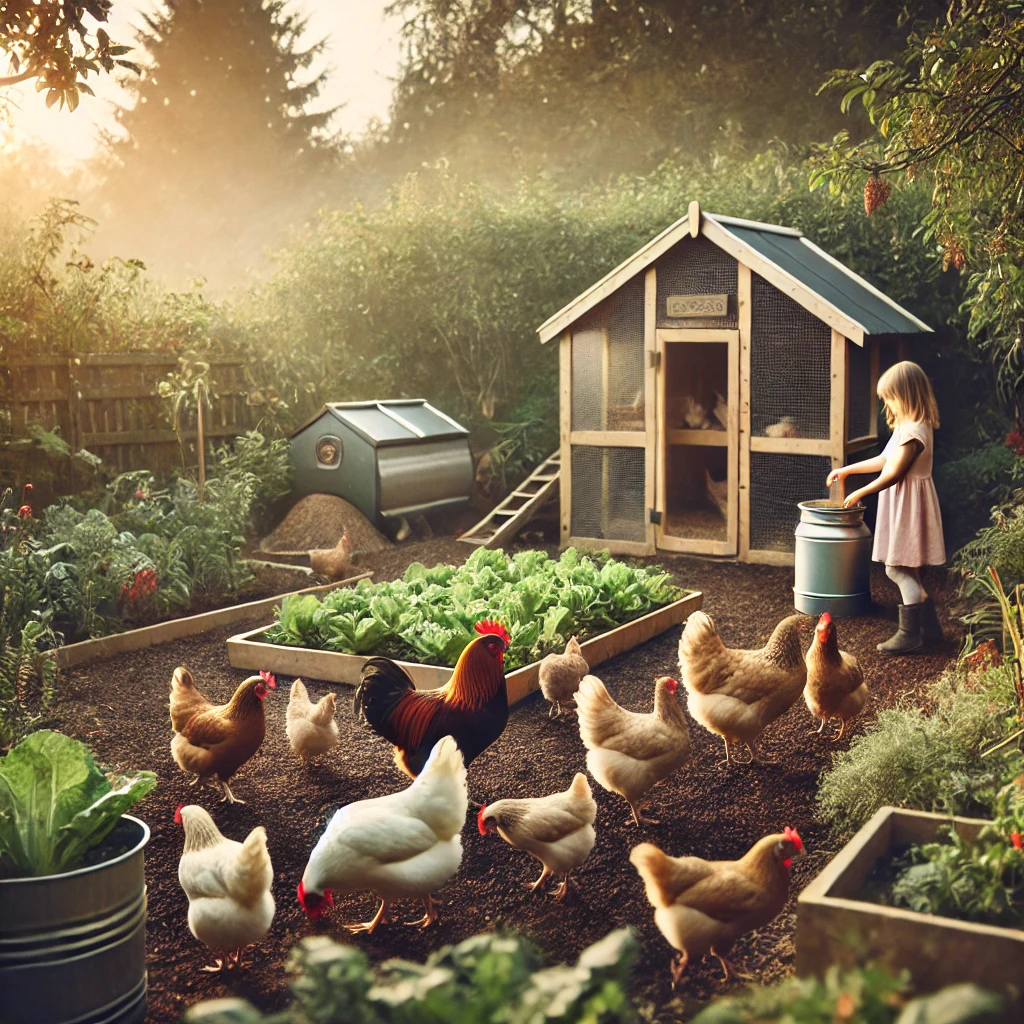
A peaceful backyard setting with free-ranging chickens, a compost pile, and a thriving vegetable garden, showcasing the sustainable and emotional benefits of raising backyard chickens.
Backyard chickens are well-known for their fresh eggs and natural pest control, but their benefits go far beyond the obvious. These feathered companions contribute to sustainability, promote mental well-being, and even enhance family and community connections. If you’ve been considering starting a flock, here’s why the hidden benefits of backyard chickens might make them the perfect addition to your life.
1. Sustainability Benefits of Backyard Chickens
Backyard chickens are a cornerstone of sustainable living, offering eco-friendly solutions for waste reduction, natural fertilization, pest control, and food production.
Reducing Food Waste
Chickens are nature’s ultimate recyclers, turning kitchen scraps into valuable resources:
- Minimizing Landfill Waste: Chickens consume fruit peels, vegetable scraps, stale bread, and other leftovers, significantly reducing organic waste sent to landfills.
- Closing the Waste Cycle: What might otherwise be trash is transformed into nutrient-rich manure and protein-packed eggs, creating a closed-loop system in your backyard.
Pro Tip: Avoid giving chickens foods that are toxic to them, such as avocado pits, chocolate, or moldy scraps.
Natural Fertilizer Production
Chicken manure is often referred to as “gardener’s gold” for its unparalleled fertilizing capabilities:
- High Nitrogen Content: Chicken droppings are rich in nitrogen, phosphorus, and potassium—essential nutrients for plant growth.
- Boosting Soil Health: Composting chicken manure improves soil texture and fertility, reducing the need for synthetic fertilizers.
Pro Tip: Always compost chicken manure before applying it to plants to prevent root damage from high nitrogen levels.
Pest Control
Chickens naturally manage pests, keeping your yard healthy and balanced:
- Insect Hunters: Chickens forage for ticks, beetles, and flies, reducing pest populations without chemicals.
- Ecosystem Support: By controlling pests, chickens help pollinators thrive, maintaining a balanced garden ecosystem.
Pro Tip: Rotate your chickens’ foraging areas to ensure consistent pest control and protect delicate plants.
Egg Production
Fresh eggs from backyard chickens provide both environmental and nutritional advantages:
- Lower Carbon Footprint: Home-raised eggs eliminate transportation emissions tied to store-bought eggs.
- Superior Quality: Backyard eggs are often fresher, tastier, and richer in nutrients like omega-3 fatty acids.
- Self-Sufficiency: Maintaining a flock reduces reliance on store supplies, particularly during shortages.
Pro Tip: Ensure your chickens have a balanced diet and fresh water to maintain egg quality.
2. Mental Health Benefits of Backyard Chickens
Beyond sustainability, backyard chickens are an unexpected source of mental well-being.
Stress Reduction
Spending time with chickens provides natural stress relief:
- Soothing Sounds: Their gentle clucking and curious behavior promote relaxation.
- Lower Cortisol Levels: Studies show interacting with animals, including chickens, reduces cortisol (the stress hormone).
- Therapeutic Engagement: Watching chickens forage and interact creates a meditative effect.
Pro Tip: Dedicate a few minutes daily to observe your flock and unwind.
Increased Mindfulness
Caring for chickens encourages mindfulness by establishing daily routines:
- Daily Rituals: Feeding, cleaning, and observing chickens fosters a sense of presence and focus.
- Simple Joys: Collecting eggs and observing interactions foster gratitude for life’s smaller moments.
Pro Tip: Turn chicken care into a tech-free moment to recharge mentally.
Combatting Loneliness
Chickens provide companionship and a sense of purpose:
- Engaging Personalities: Each chicken has unique quirks that make them delightful to watch.
- Reducing Isolation: Caring for chickens creates a daily sense of responsibility and connection.
Pro Tip: Share chicken care duties with family members to foster shared joy.
Encouraging Outdoor Activity
Chicken care naturally encourages time outdoors:
- Physical Engagement: Tasks like cleaning coops and refilling waterers promote movement.
- Fresh Air Benefits: Outdoor exposure enhances mood and overall well-being.
Pro Tip: Pair chicken care with gardening for added physical and mental benefits.
3. Benefits for Families and Communities
Backyard chickens foster learning, connection, and resilience, benefiting families and neighborhoods alike.
Teaching Responsibility
Raising chickens is an engaging way to instill responsibility, especially in children:
- Life Skills: Kids learn daily care routines, from feeding to collecting eggs.
- Understanding the Food Cycle: They gain awareness of sustainable food practices.
- Empathy Building: Caring for living creatures fosters compassion and respect for animals.
Pro Tip: Assign age-appropriate chicken care tasks to family members, such as collecting eggs or cleaning nesting boxes.
Building Community
Chickens create opportunities for neighbors to connect:
- Sharing Resources: Extra eggs or gardening tips build goodwill and foster connections.
- Local Networks: Chickens can connect you with urban farming or sustainability groups.
Pro Tip: Host a coop tour or egg swap event to engage your local community.
Emergency Preparedness
Backyard chickens offer reliability during shortages:
- Consistent Food Source: Fresh eggs provide nutrition when supplies are limited.
- Self-Sufficiency: Chickens reduce reliance on external food sources, particularly in emergencies.
Pro Tip: Keep extra feed and ensure coops are predator-proof to secure your flock’s safety.
4. Environmental Benefits Beyond Sustainability
Backyard chickens contribute to healthier ecosystems and more efficient gardening practices.
Supporting Pollinator Health
Chickens aid in pest control while protecting beneficial pollinators:
- Natural Balance: Chickens eat pests like ticks and beetles without disturbing bees or butterflies.
Pro Tip: Rotate chickens away from flowering plants to preserve pollinators while maintaining pest control.
Soil Aeration
Chickens naturally improve soil quality through their scratching behavior:
- Tilling Action: Scratching and pecking aerates soil and improves texture, allowing water and nutrients to penetrate more effectively.
Pro Tip: Allow chickens to forage in garden beds during the off-season for natural soil preparation.
Composting Contributions
Chickens accelerate composting processes with their manure:
- Nitrogen Boost: Chicken droppings add essential nutrients to compost piles, making them ideal for garden enrichment.
Pro Tip: Combine manure with carbon-rich materials like dried leaves or straw for a balanced compost mix.
DARWIN’s Take: The Zen of the Chicken Coop
Backyard chickens aren’t just barnyard animals—they’re tiny agents of ecological balance and personal joy. In an age where digital distractions dominate, these birds offer something deeper: a connection to the rhythms of nature. Watching a flock scratch and forage is like a microcosmic meditation—a reminder that life thrives in small, simple patterns. They teach us to slow down, care for living creatures, and appreciate the cycle of give and take that sustains the earth.
Owning chickens isn’t just about eggs—it’s about fostering an ecosystem in your own backyard, creating moments of stillness, and building community. In a way, chickens remind us that progress isn’t always about doing more. Sometimes, it’s about reconnecting with what’s already there.
Further Reading on Paranoid Prophet
- Paranoid Prophet – Chicken Dust Baths
This article explores the importance of dust baths for chicken health, including how they help prevent mites and lice, and offers practical advice on creating the perfect dust bath for your flock. - Paranoid Prophet – Winter Chicken Memes and Facts
A lighthearted but informative article combining fun memes with useful winter care tips for chickens, such as keeping their coop warm and maintaining a healthy diet during the colder months. - Paranoid Prophet – Wheatgrass and Hay for Winter Chickens
This resource highlights the nutritional benefits of wheatgrass and hay for chickens during winter. It explains how these additions can provide supplemental forage and improve overall flock health. - Paranoid Prophet – How Many Chickens to Start With?
A beginner’s guide for those considering starting a backyard flock. The article discusses the ideal number of chickens to raise based on space, resources, and personal goals. - Paranoid Prophet – Benefits of Raising Backyard Chickens
This article delves into the many advantages of raising backyard chickens, including fresh eggs, natural pest control, and the joy of keeping these engaging animals as part of a sustainable lifestyle.
SOURCES
- “Egg-cellent Gardens: Cultivating Success with Backyard Chickens”
This article from the University of California Agriculture and Natural Resources discusses how composting chicken manure can enhance soil health and fertility, promoting sustainable gardening practices. UC Agriculture & Natural Resources - “The Truth About Cats and Dogs: Pets Are Good for Mental Health of ‘Everyday People'”
Published by the American Psychological Association, this study examines how pet ownership, including animals like chickens, can improve well-being and reduce stress. American Psychological Association - “Manure—Gardener’s Gold”
This Napa Master Gardener Column highlights the benefits of using composted chicken manure as a nutrient-rich fertilizer, contributing to sustainable gardening. UC Agriculture & Natural Resources - “Nurtured by Nature”
An article from the American Psychological Association exploring how interactions with nature and animals can enhance mental health, suggesting that keeping backyard chickens may offer similar benefits. American Psychological Association - “Friends With Benefits: On the Positive Consequences of Pet Ownership”
This research paper discusses the psychological benefits of pet ownership, including reduced loneliness and increased social interaction, which can be applicable to keeping backyard chickens. American Psychological Association
FAQ: Hidden Benefits of Backyard Chickens for Sustainability and Mental Health
Sustainability Questions
1. How do backyard chickens promote sustainability?
Backyard chickens help reduce food waste by consuming kitchen scraps, produce natural fertilizer through their manure, and reduce reliance on pesticides by controlling pests like ticks and beetles.
2. Can chicken manure be used as fertilizer?
Yes! Chicken manure is rich in nitrogen and other nutrients, making it an excellent addition to compost for garden soil enrichment.
3. How do chickens contribute to eco-friendly egg production?
Raising backyard chickens reduces the carbon footprint associated with commercial egg production and transportation, offering fresh eggs with minimal environmental impact.
4. Are backyard chickens effective for pest control?
Chickens naturally forage for insects, including ticks, beetles, and flies, reducing the need for chemical pesticides in your yard.
Mental Health Questions
5. How can chickens improve mental health?
Interacting with chickens can reduce stress, promote mindfulness, and combat loneliness. Their curious and calming behaviors create a therapeutic experience for owners.
6. Do chickens encourage outdoor activity?
Yes! Caring for chickens requires regular coop cleaning, feeding, and observation, which encourages physical activity and fresh air.
7. Can keeping chickens reduce stress?
Spending time with chickens has been shown to lower cortisol levels, helping to alleviate stress and improve overall well-being.
Family and Community Benefits
8. Are backyard chickens good for teaching children responsibility?
Yes! Caring for chickens teaches kids important lessons about animal care, responsibility, and the food cycle, from feeding chickens to collecting eggs.
9. How do chickens build community?
Backyard chickens encourage neighbors to share eggs, tips, and stories, fostering a sense of connection and community.
10. Can backyard chickens help in emergencies?
Absolutely. Chickens provide a reliable source of fresh eggs during food shortages or supply chain disruptions.
General Care and Considerations
11. What do backyard chickens eat?
Chickens thrive on a diet of high-quality feed, kitchen scraps, and forage. Treats like fruits and vegetables should complement, not replace, their primary diet.
12. How much space do chickens need?
Each chicken requires about 2–3 square feet of coop space and 8–10 square feet of outdoor run space to roam comfortably.
13. Are backyard chickens noisy?
Hens are relatively quiet compared to roosters. They make soft clucking sounds, but a rooster’s crow can be loud, so check local ordinances if you plan to keep one.


